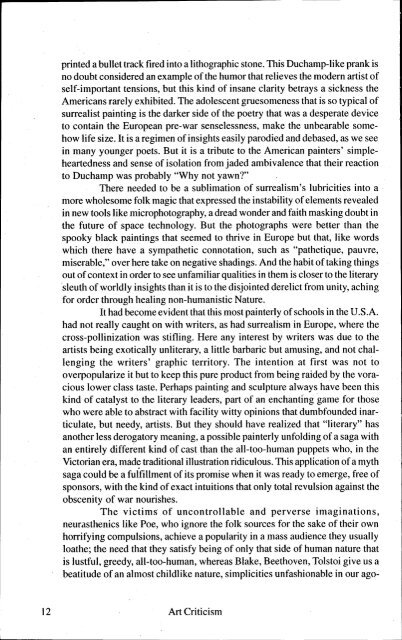Art Criticism - The State University of New York
Art Criticism - The State University of New York
Art Criticism - The State University of New York
Create successful ePaper yourself
Turn your PDF publications into a flip-book with our unique Google optimized e-Paper software.
printed a bullet track fired into a lithographic stone. This Duchamp-like prank is<br />
no doubt considered an example <strong>of</strong> the humor that relieves the modern artist <strong>of</strong><br />
self-important tensions, but this kind <strong>of</strong> insane clarity betrays a sickness the<br />
Americans rarely exhibited. <strong>The</strong> adolescent gruesomeness that is so typical <strong>of</strong><br />
surrealist painting is the darker side <strong>of</strong> the poetry that was a desperate device<br />
to contain the European pre-war senselessness, make the unbearable somehow<br />
life size. It is a regimen <strong>of</strong> insights easily parodied and debased, as we see<br />
in many younger poets. But it is a tribute to the American painters' simpleheartedness<br />
and sense <strong>of</strong> isolation from jaded ambivalence that their reaction<br />
to Duchamp was probably "Why not yawn?"<br />
<strong>The</strong>re needed to be a sublimation <strong>of</strong> surrealism's lubricities into a<br />
more wholesome folk magic that expressed the instability <strong>of</strong> elements revealed<br />
in new tools like microphotography, a dread wonder and faith masking doubt in<br />
the future <strong>of</strong> space technology. But the photographs were better than the<br />
spooky black paintings that seemed to thrive in Europe but that, like words<br />
which there have a sympathetic connotation, such as "pathetique, pauvre,<br />
miserable," over here take on negative shadings. And the habit <strong>of</strong> taking things<br />
out <strong>of</strong> context in order to see unfamiliar qualities in them is closer to the literary<br />
sleuth <strong>of</strong> worldly insights than it is to the disjointed derelict from unity, aching<br />
for ordcr through healing non-humanistic Nature.<br />
It had become evident that this most painterly <strong>of</strong> schools in the U.S.A.<br />
had not really caught on with writers, as had surrealism in Europe, where the<br />
cross-pollinization was stifling. Here any interest by writers was due to the<br />
artists being exotically unliterary, a little barbaric but amusing, and not challenging<br />
the writers' graphic territory. <strong>The</strong> intention at first was not to<br />
overpopularize it but to keep this pure product from being raided by the voracious<br />
lower class taste. Perhaps painting and sculpture always have been this<br />
kind <strong>of</strong> catalyst to the literary leaders, part <strong>of</strong> an enchanting game for those<br />
who were able to abstract with facility witty opinions that dumbfounded inarticulate,<br />
but needy, artists. But they should have realized that "literary" has<br />
another less derogatory meaning, a possible painterly unfolding <strong>of</strong> a saga with<br />
an entirely different kind <strong>of</strong> cast than the all-too-human puppets who, in the<br />
Victorian era, made traditional illustration ridiculous. This application <strong>of</strong> a myth<br />
saga could be a fuifillment <strong>of</strong> its promise when it was ready to emerge, free <strong>of</strong><br />
sponsors, with the kind <strong>of</strong> exact intuitions that only total revulsion against the<br />
obscenity <strong>of</strong> war nourishes.<br />
<strong>The</strong> victims <strong>of</strong> uncontrollable and perverse imaginations,<br />
neurasthenics like Poe, who ignore the folk sources for the sake <strong>of</strong> their own<br />
horrifying compulsions, achieve a popularity in a mass audience they usually<br />
loathe; the need that they satisfy being <strong>of</strong> only that side <strong>of</strong> human nature that<br />
is lustful, greedy, all-too-human, whereas Blake, Beethoven, Tolstoi give us a<br />
beatitude <strong>of</strong> an almost childlike nature, simplicities unfashionable in our ago-<br />
12<br />
<strong>Art</strong> <strong>Criticism</strong>
















